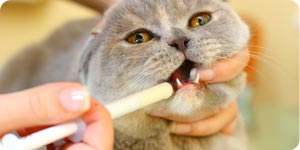
Just like people, cats can become dehydrated. Cats become dehydrated through vomiting and illnesses, lack of available water, or extreme summer heat. In many cases, dehydration may be caused by an underlying issue, like kidney issues or diabetes. For cats, dehydration requires immediate care, and sometimes even a vet visit. Here’s how to treat a dehydrated cat:
- Check your cat’s hydration levels. If you think your cat may be dehydrated, gently pinch a bit of skin near your cat’s neck. If it does not return to its natural position quickly, your cat is very dehydrated, and you should call a vet. Other symptoms of severe dehydration include a dry mouth and tacky, dry (not slick and wet) gums, sunken eyes, or a cat that seems to exhausted to move. If you notice any of these extreme symptoms, take your cat to the veterinarian immediately.
- Provide water. If you think your cat is dehydrated but it doesn’t seem severe enough to require immediate veterinarian care, provide water immediately, but don’t let your cat drink too much, or it may upset his stomach. Instead, give a little water in the cat’s regular water bowl every 15 minutes.
- Give your cat electrolytes. Dehydrated cats need not only water but also electrolytes. You can give your cat an electrolyte-rich drink, such as unflavored Pedialyte, to restore his electrolytes. Give small amounts of Pedialyte through an eye dropper over the course of an hour or so. If you don’t have access to Pedialyte, Gatorade may also work. Once a cat is drinking on his own, mix Pedialyte or Gatorade with water in the cat’s drinking bowl.
- Offer ice chips. If your cat is vomiting water, ice chips to lick can begin the rehydration process slowly to help your cat keep the water down. Make sure to offer small chips, not cubes of ice that could become a choking hazard.
- Offer baby food or canned food. Canned foods include more moisture than dry ones, and can increase your cat’s hydration levels slowly. Feed canned cat food or meat baby food (with no onion or garlic).
- Take your cat to the vet. If your cat does not show signs of improvement quickly after home treatment, or shows signs of severe dehydration, take your cat to the vet. Dehydration in cats is a serious and dangerous condition. A vet can treat a dehydrated cat by providing subcutaneous or intravenous fluids to bring your cat’s hydration levels up quickly and safely.
Low or mild levels of dehydration can be treated at home, but severe cases require prompt veterinary treatment. Do not try to treat a dehydrated cat at home if you suspect severe dehydration or an underlying illness or health problem. If you are dealing with small kittens that are dehydrated due to vomiting or diarrhea, take them to the vet immediately. Always make sure that your cat has plenty of clean, cool water, and a cool place to sit during the hot summer months, to prevent dehydration.
